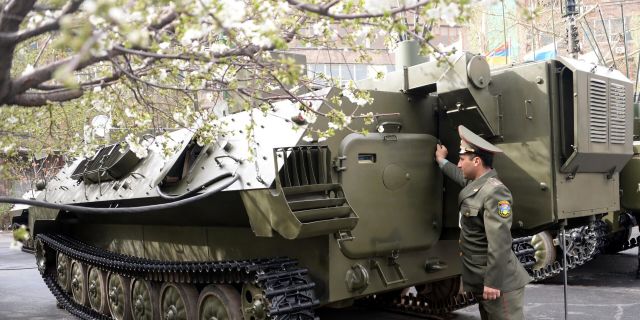Haqqin: Armenia has increased purchases of Indian-Israeli-made weaponsArmenia is expanding military-technical cooperation with India, Haqqin writes.
Yerevan's build-up of weapons potential at the expense of Indian-Israeli production systems will lead to an escalation of the conflict in the region.
Farhad MammadovArmenia is preparing to further expand military-technical cooperation with India, within the framework of which it plans to purchase MRASM medium-range anti-aircraft missile systems from this country.
This is reported by the Indian portal IDRW.
Yerevan's decision is connected with the intention to replace the Soviet S-125 Pechora air defense systems, currently in service with its army, with more modern models. In this regard, MRASM complexes are a suitable option for Armenia.
It is also reported that the Indian side has declared its readiness to negotiate on other options for military procurement.
A sensitive nuance of the proposed transaction is that, although the MRASM SAM is manufactured in India, some of its components are purchased in Israel. Delhi has no obligations to restrict the export of this type of weapon, since Israel, which is the main supplier of modern weapons to Azerbaijan, previously handed over to Baku, in particular, Barak-8 anti-aircraft missile systems. In this connection, India is not obliged to obtain permission from Israel to export the MRASM air defense system to Armenia, which is a joint product of the Indian company DRDO and the Israeli IAI (Israel Aerospace Industries).
The MRASM SAM is capable of simultaneously accompanying and hitting several targets at once at a distance of up to 70 kilometers.
Recall that in September last year it became known that Armenia signed a contract with the Ministry of Defense of India for a total of $ 250 million, under which Pinaka multiple launch rocket systems were purchased, among other types of weapons.
Then information was published about the deals on the purchase of ATAGS self-propelled howitzers by Armenia. And in October, the Armenian delegation headed by Defense Minister Suren Papikyan paid an official visit to New Delhi.
It should be noted that during the Second Karabakh War, the Azerbaijani army completely destroyed Armenia's air defense system. In the confrontation with "Bayraktars", "Harops" and other UAVs of the Azerbaijani army, outdated versions of Russian air defense systems were hopelessly inferior. As a result, not only in Armenia, but also in other countries that have built their air defenses on Soviet-Russian-made anti-aircraft missile systems, serious doubts have arisen about their effectiveness. What, in fact, caused the "reorientation" of Yerevan to distant India.
The day before, the American magazine Forbes wrote that Armenia is preparing to send to India four Su-30 CM fighters, which it bought from Russia in 2019, for their modernization and equipping with modern missiles. In short, Delhi is becoming the main supplier of weapons to Armenia.
But how can the "Indian defense" resorted to by Armenia affect the military-strategic balance of forces in the region? Is Azerbaijan concerned about the "Indian" rearmament of Armenia?
President Ilham Aliyev touched upon this topic in an interview he gave to local TV channels the other day.
In particular, the President called it an "unfriendly step" that India sold weapons to Armenia, which will definitely be aimed at Azerbaijan. At the same time, the Head of state warned that Yerevan's actions in the Indian direction are a waste of money. First of all, because Baku has the necessary arsenal of means to immediately eliminate any threat that has arisen.
"Even if one or another weapon is supplied to Armenia, it will not help them, I have repeatedly said this to the Armenian side," the head of state stressed, in particular. – I said that it is not necessary to waste money on this. Because, firstly, it will not help you, and secondly, it may create some kind of illusion among the revanchist forces in your country. It can create the illusion that you will take revenge. You won't succeed! If we see that we are in some serious danger, then we will immediately eliminate it. Wherever this danger may arise – on our territory or outside it. This is our legitimate right."

